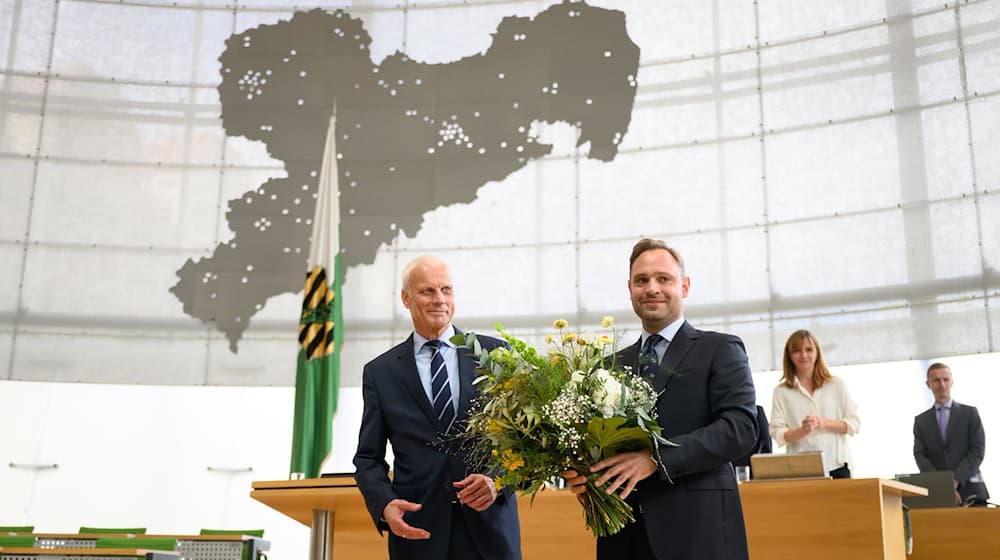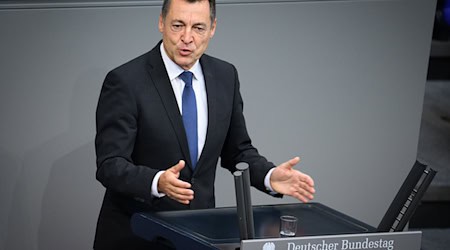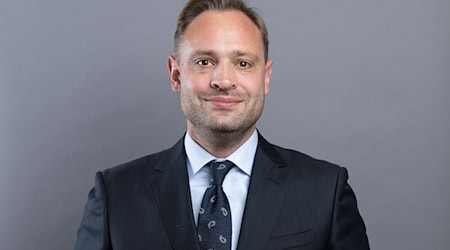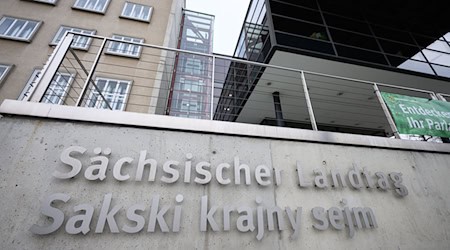The new Saxon state parliament has been constituted and, in addition to adopting its rules of procedure, has also made its first personnel decisions. CDU politician Alexander Dierks will serve as President of the state parliament for the next five years. He received 97 out of a possible 119 votes. 14 MPs voted against him, eight abstained. Dierks is the youngest state parliament president in Saxony to date. He will be 37 years old on Wednesday. The office has previously only been held by men.
Surprise in the election of two vice presidents
In the election of deputies, CDU MP Ines Saborowski (57) came out on top with 95 votes. The second deputy is André Wendt from the AfD. The 53-year-old already held the position in the last legislative period. He received 84 yes votes in the re-election. BSW candidate Jörg Scheibe only made it in the second round of voting with 71 votes. Albrecht Pallas (SPD) even had to go three rounds. In the secret ballot, the majority of valid votes cast was enough. Pallas received 60 votes.
Thought-provoking note for alliance Sahra Wagenknecht and above all for the SPD
The voting behavior can be confidently interpreted as a lesson for the BSW and the SPD. Both parties are currently holding preliminary talks to prepare for exploratory talks and coalition negotiations for a joint government. The three partners have a total of 66 seats in the state parliament. Both Scheibe and Pallas should therefore have easily got through the first election campaign if they had been in agreement. It should now be clear how difficult it will be to form a coalition.
The Social Democrats had insisted on an additional fourth Vice-President, which also caused a lot of criticism at the constituent meeting. After all, the post means considerable additional costs for the taxpayer. The SPD was obviously punished by the lack of votes for Pallas in the first two rounds of voting.
Having good, controversial and tough debates
Before Dierks took his seat in the President's chair, he addressed the MPs. Parliament is the playing field on which political debates are held and the diversity of opinions, wishes, needs and criticisms are expressed, he said. He hoped that the state parliament would live up to this mission.
"We are competitors. We are sometimes opponents in tough debates. But we are never enemies," said Dierks to applause from the MPs. Parliament is the place where parliamentary democracy can prove that it is capable of finding solutions to major social conflicts. Democracy is more than just a mathematical counting procedure to determine the majority.
Age President appeals for fairness and decency
At the beginning of the constituent session, Age President Wolf-Dietrich Rost called for fairness and decency in the new electoral term. The six parliamentary groups would represent a broad political spectrum and consensus would certainly not be the rule. The willingness to put up with the opinions of others, to weigh up the arguments and to take a different perspective on things has unfortunately declined in recent years. "As MPs, we should act differently and set a good example."
Landtag introduces changes with new rules of procedure
The Landtag adopted new rules of procedure with the votes of the CDU, BSW, SPD and Greens. The AfD, the Left Party and the non-attached MP Matthias Berger, who sits in parliament for the Free Voters, abstained. Some procedures have been revised. In addition to interposed questions, interjections are now also permitted in order to enliven the debate. Previously, a specific question was required. Questioning of the state government will be streamlined.
The CDU, BSW and SPD parliamentary groups jointly tabled the motion on the new rules of procedure. Several amendments from the ranks of the AfD and the Left Party as well as a motion from Berger fell through.
Landtag adopts Green amendment
In contrast, an amendment from the Greens, which was tabled in view of the turbulence in the constituent session of the Thuringian Landtag on September 26, was approved. There, the old-age president from the AfD had put the brakes on the procedure. The Greens proposed a wording for the rules of procedure in Saxony that would make it clear that the newly elected state parliament can exercise its full procedural rights right from the start of the constituent session.
In the state parliament elections on September 1, the CDU was the strongest party with 31.9%, giving it 41 seats in the state parliament. The AfD (30.6%) has 40 seats, the BSW (11.8%) has 15 and the SPD (7.3%) has ten MPs. The Greens (5.1%) are represented by seven MPs. The Left Party (4.5 percent), which only entered the state parliament thanks to winning two direct mandates, has six seats, while the Free Voters have one.
Copyright 2024, dpa (www.dpa.de). All rights reserved




